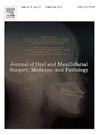hpv阳性口咽癌中免疫相关中枢基因作为预后生物标志物的研究
IF 0.4
Q4 DENTISTRY, ORAL SURGERY & MEDICINE
Journal of Oral and Maxillofacial Surgery Medicine and Pathology
Pub Date : 2025-04-24
DOI:10.1016/j.ajoms.2025.03.012
引用次数: 0
摘要
人乳头瘤病毒(HPV)感染是头颈部鳞状细胞癌(HNSCC)的重要危险因素,口咽癌主要归因于HPV。临床研究一致表明,hpv阳性口咽癌患者的预后明显优于hpv阴性口咽癌患者。因此,了解影响hpv阳性患者预后的关键基因至关重要。本研究旨在确定导致hpv阳性和hpv阴性口咽癌患者预后差异的必要基因。利用基因表达Omnibus (GEO)获得的GSE72536和GSE55544数据集,我们进行了综合分析,发现了10个在hpv阳性口咽癌组织中显著过表达的枢纽基因(IFNG、CD19、CD27、CD2、CD247、PDCD1、KLRK1、LAG3、FASLG和KLRB1)。这些基因与改善预后密切相关,并与免疫细胞活化和浸润密切相关,有助于产生有效的抗肿瘤免疫反应。在这些中心基因介导的hpv阳性癌症中观察到的增强的免疫反应,解释了hpv阳性口咽癌患者预后更好和总生存期(OS)更长。这些发现表明,这些中心基因可能是有价值的预后生物标志物和潜在的治疗靶点。这强调了个性化治疗策略在改善hpv阳性口咽癌患者临床结果中的重要性。本文章由计算机程序翻译,如有差异,请以英文原文为准。
Investigation of immune-related hub genes as prognostic biomarkers in HPV-positive oropharyngeal cancer
Human papillomavirus (HPV) infection is a significant risk factor for head and neck squamous cell carcinoma (HNSCC), with oropharyngeal cancer being predominantly attributed to HPV. Clinical studies have consistently demonstrated that patients with HPV-positive oropharyngeal cancer exhibit a markedly better prognosis compared to those with HPV-negative oropharyngeal cancer. Consequently, understanding the key genes that influence the prognosis of HPV-positive patients is critical. This study aimed to identify the essential genes contributing to the prognostic differences observed between HPV-positive and HPV-negative oropharyngeal cancer patients. Utilizing GSE72536 and GSE55544 datasets obtained from the Gene Expression Omnibus (GEO), we conducted a comprehensive analysis and identified ten hub genes (IFNG, CD19, CD27, CD2, CD247, PDCD1, KLRK1, LAG3, FASLG, and KLRB1) that are significantly overexpressed in HPV-positive oropharyngeal cancer tissues. These genes strongly correlate with improved prognosis and are closely associated with immune cell activation and infiltration, contributing to a potent antitumor immune response. The enhanced immune response observed in HPV-positive cancers, mediated by these hub genes, explains the better prognosis and longer overall survival (OS) associated with HPV-positive oropharyngeal cancer patients. These findings indicate that the identified hub genes could be valuable prognostic biomarkers and potential therapeutic targets. This underscores the importance of personalized treatment strategies in improving clinical outcomes for HPV-positive oropharyngeal cancer patients.
求助全文
通过发布文献求助,成功后即可免费获取论文全文。
去求助
来源期刊

Journal of Oral and Maxillofacial Surgery Medicine and Pathology
DENTISTRY, ORAL SURGERY & MEDICINE-
CiteScore
0.80
自引率
0.00%
发文量
129
审稿时长
83 days
 求助内容:
求助内容: 应助结果提醒方式:
应助结果提醒方式:


